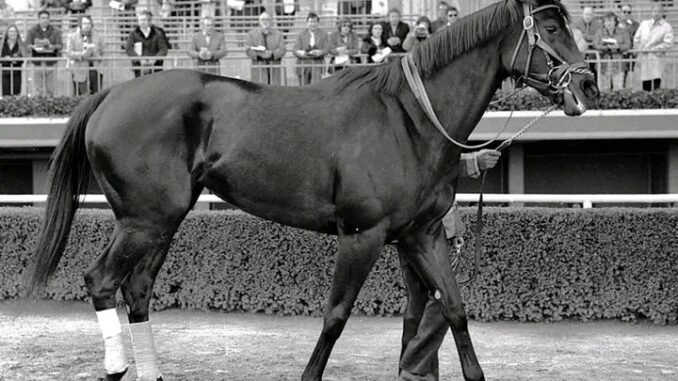
In the annals of horse racing, few names evoke as much admiration and sorrow as Ruffian. Her story is one of unmatched talent, fierce determination, and a tragic end that forever altered the sport’s history. Commentators like Heywood Hale Broun captured the essence of her remarkable spirit, emphasizing her regal presence and indomitable will. Broun famously remarked that Ruffian’s uniqueness lay in her relentless drive to lead—“until the moment of the tragic accident, no horse had ever been in front of her. In her regal and majestic way she denied the lead to one and all. She was not going to allow it if it killed her. And it did kill her. As a sporting tragedy it is ahead of anything I can remember.” This statement encapsulates not only her extraordinary natural talent but also the tragic cost of her fierce competitiveness.
Ruffian was born in 1972 and quickly garnered attention with her stunning performances on the racetrack. From her early races, it was evident that she possessed a rare combination of speed, stamina, and an almost regal demeanor. Her sleek, powerful physique and commanding presence earned her the nickname “The Queen of the Turf.” But what set her apart was her unwavering desire to dominate every race she entered. Unlike many competitors who would settle into strategic positions, Ruffian’s instinct was to seize the lead and hold it at all costs.
Broun’s observation highlights a fundamental aspect of Ruffian’s racing style: her refusal to concede the front. She was a horse that demanded control, asserting dominance from the outset. In doing so, she challenged the conventions of racing strategy and became a symbol of raw, unyielding spirit. Her unwavering determination often left spectators breathless, marveling at her ability to maintain her blistering pace and her refusal to back down even when challenged. It was this tenacity that made her a favorite among fans and a formidable opponent to her rivals.
However, Broun’s reflection also underscores the tragic irony that defines Ruffian’s story. Her fierce will to win ultimately contributed to her downfall. In 1975, during a match race against the colt Foolish Pleasure, Ruffian sustained a catastrophic injury—a broken sesamoid bone in her left front leg. Despite efforts to save her, the injury was too severe. Her death was swift and heartbreaking, a profound loss to the sport and her admirers. Broun’s words acknowledge the heartbreak that accompanies such a loss—the realization that her relentless pursuit of victory led her to a fate that was as tragic as it was inevitable.
Ruffian’s legacy extends beyond her racing record. She became a symbol of the purity of competition, embodying the spirit of perseverance and resilience. Her story prompted advancements in racehorse safety and veterinary care, raising awareness about the risks inherent in high-stakes racing. Moreover, her memory continues to inspire horse trainers, jockeys, and racing fans who admire her strength and determination.
The tragedy of Ruffian also serves as a somber reminder of the costs of human ambition and the relentless pursuit of excellence. Broun’s poignant words remind us that behind every champion lies a delicate balance between glory and vulnerability. Ruffian’s life and death exemplify the fine line that exists in competitive sports—where the desire to win can sometimes overshadow considerations of safety and well-being.
In the end, Ruffian remains an indelible figure in the history of racing—an icon of grace, power, and tragic beauty. Her story continues to resonate, reminding us of the heights that passion can reach and the depths of loss that can follow. Heywood Hale Broun’s reflection captures her essence perfectly: a majestic creature whose spirit refused to be subdued, even in the face of ultimate sacrifice. As long as racing endures, Ruffian’s memory will inspire awe and serve as a testament to the extraordinary, if fleeting, brilliance of a truly incomparable racehorse.
—
Leave a Reply